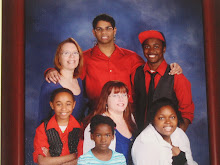I remember when homeschooling was definately a "fringe" group. Kind of viewed like they were all ultra conservative Christians (and I am not knocking those who are--just that in our area, back in say the 80s there were no homeschool groups that were not Christian). When I even tried to sort of join such a group figuring that although we would not fit theologically, surely our shared passion for learning would allow us to bond I was politely but firmly informed I was not welcome and "would not be happy there." Well maybe, maybe not, I have a pretty amazing capacity to bloom where I am planted. LOL But I strongly suspect that a gay pagan of a differently abled child was not what they were up for. So we agreed to soldier on alone.
Except that thanks to the internet, it wasn't really alone. I found a cool group of pagan homeschoolers on line (which eventually became two groups) and for years they were my lifeline as we homeschooled our Chet. It was sort of because of us that homeschool programs eventually were developed at a local wildlife sanctuary as we found ways to utilize work at hte sanctuary to supplement his curricula experiences.
Now, homeschooling is so not the fringe. It is decidedly more common, and almost mainstream. At my church there are a fair number of homeschoolers and we are from all walks of life and all have rather different approaches to the education of our various children. But we share a love of learning and that has been a real gift of this journey.
You can't stagnate if you homeschool. And I love watching my kids minds explore, roll ideas around and then spit out questions or hypothesis. I like watching Rob wrestle with a topic and come up with a really meaty concept--something that i know in public school he would manage to avoid (making paper airplanes and chatting with peers being of greater fascination.) I like watching Lissa develop her early spatial concepts when she works in the mornings, and having KC share his insights. (tonight at shower time he wanted to know how it was that a chicken egg was warm after it was laid.)
So when a friend at church shared information on her blog about a citizen science project, we were all in!
The Sunflower Project allows us to help provide critical data about bee populations. We will grow a particular type of sunflower (I all ready ordered our seeds) and grow them in pots in one of the few sunny areas of our yard. Then for 15 minutes each day we will chart how many bees if any visit our plants and then enter our info via computer. I considered doing this up at our community garden but it would be harder to be consistant with the observation time there. We consume a fair amount of honey in our house, and the kids are reasonably well versed in how crucial bees are to the food we consume. But to find out some hard facts about the bee population in our area is a different slant on things and they are intrigued. Let's hope for a good growing season so our plants will be fruitful. Sadly the sunflowers I planted last year washed away in the 6 weeks of rain that passed for our New England spring!
Subscribe to:
Post Comments (Atom)





1 comment:
this is a great idea! thanks for sharing!
Post a Comment